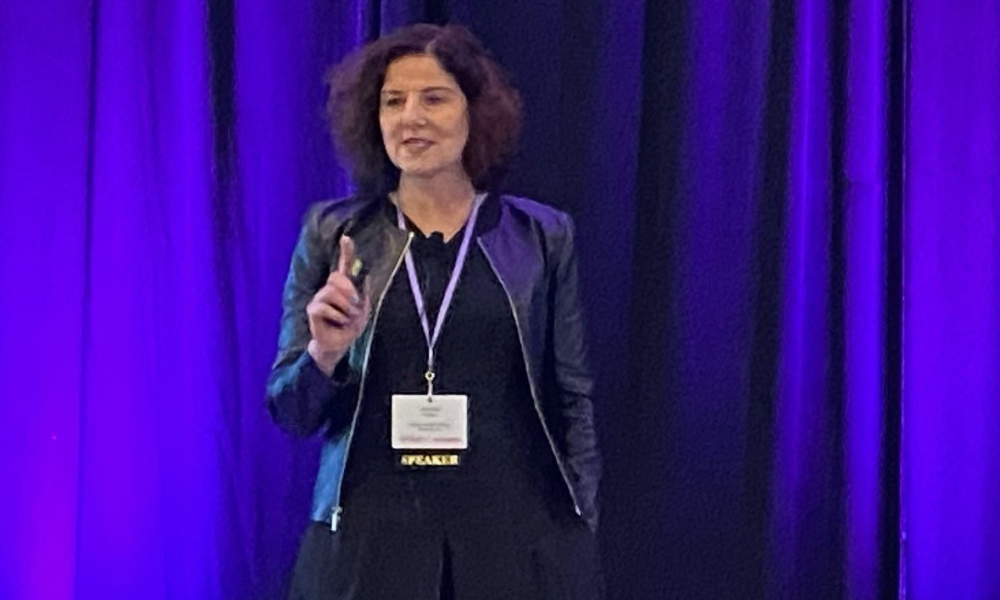

While the wealth management space increasingly embraces the power of diversity – there’s still a notable way to go.
Speaking to IN, Jennifer Rutley, founder and principal at Hidden Insights Group, says that there’s a stark difference between the hurdles faced by women when compared to men in the sector.
The speaker at our upcoming Women Advisor Summit New York says she asked 60 women advisors where they have seen other women advisors struggle in their career and “the overwhelming answer... was lack of confidence,” she explains.
This lack of confidence often stems from the fact that women remain a minority in the industry, making up only about 20-25% of financial advisors. As a result, women face heightened pressure to perform, which manifests in several ways like being the token woman who sits on committees or mentors all other women. Rutley pinpointed a story from a Black woman advisor who noted that she was always the focal point of attention at industry conferences, as photographers seemed to be hyper-focused on her.
“She knew all the photographers at conferences by name because they always focused on her,” Rutley says. This attention comes with a price: the pressure to represent and succeed on behalf of all women in the field. For many, this expectation creates stress and burnout as the pursuit of perfection becomes overwhelming.
Rutley also spoke about the problem of assimilation and how it also contributes to a lack of women’s confidence in male-dominated workplaces. Women often feel compelled to fit in by adopting behaviors or participating in activities that are uncomfortable. When women act like men, we lose the value that their diverse perspectives brings to the industry, and no one wins.
“There is a constant tension around how to still be you when... there’s a lot of fraternal activities going on,” Rutley explains. The still pervasive "good old boys club" culture in the financial advisor sector creates environments where women either assimilate or risk feeling isolated. Those who choose not to conform often find themselves left out and unsupported.
The result? Isolation, which further fuels the lack of confidence many women experience. And then there's the Queen Bee Syndrome, where women who reach senior levels distance themselves from junior women and legitimize gender inequality in their organization.
“The idea is that isolation has gotten them to that place, so they reinforce it rather than use their leadership to change the culture. So that doesn’t benefit anybody, really,” Rutley says. Adding to these barriers are issues like workplace harassment, pay disparity, and job segregation, with women still underrepresented in client-facing roles like financial advisors and overrepresented in back-office functions.
“We definitely see job segregation,” Rutley says.
When asked about inclusive leadership practices, Rutley was quick to point out that many organizations still don't grasp what inclusive leadership truly means.
"We need people that exemplify inclusive leadership by demonstrating traits like curiosity, authenticity, and intellectual humility,” she tells IN. These firms not only emphasize women-specific efforts like mentorship programs and women's conferences, but they also proactively look at their broader organization for opportunities to improve culture and build equitable practices.
Rutley is also quick to highlight how women in wealth management can drive change within their organizations. She tells IN that women should stay true to their values and boundaries, resisting the urge to assimilate.
The conversation soon turned to strategies for overcoming imposter syndrome, which Rutley views as deeply intertwined with these systemic barriers. A key strategy for addressing it is self-awareness and establishing clear personal boundaries.
“There’s something about having clarity and knowing yourself that replaces low confidence with authenticity,” adds Rutley.
Another crucial point Rutley raised was the importance of recognizing one’s worth, particularly in an industry that increasingly values women’s contributions. She explains how younger women advisors already grasp this idea, realizing that they “don’t need to settle for firms that don’t understand how to support women or put up a gender facade.” As more women investors emerge, firms are recognizing the need for female advisors, and this demand gives women the power to be selective about where they work.
However, Rutley was clear about one thing: women should avoid trying to succeed in isolation. Whether it’s through teaming, mentoring, sponsorship, or coaching, having a support network is crucial.
"There’s a community of people out there," she says. "Don’t go it alone."
Perhaps the most striking aspect of Rutley’s message was the notion of collective empowerment. Rather than focusing solely on their individual careers, women thrive when they lift up others.
“What really works for women is the idea of lifting up others and focusing on the ecosystem over the ego," Rutley explains, touching on research that shows how women’s collaborative approach can be more effective than trying to emulate the assertiveness and self-promotion often associated with male leadership styles.
“By lifting others and finding that inspiration… women can overcome feelings of imposter syndrome and embrace their authenticity.”
To hear more from Rutley and other industry leaders, book your tickets to Women Advisor Summit New York here.

Relationships are key to our business but advisors are often slow to engage in specific activities designed to foster them.

Whichever path you go down, act now while you're still in control.

Pro-bitcoin professionals, however, say the cryptocurrency has ushered in change.

“LPL has evolved significantly over the last decade and still wants to scale up,” says one industry executive.

Survey findings from the Nationwide Retirement Institute offers pearls of planning wisdom from 60- to 65-year-olds, as well as insights into concerns.
Streamline your outreach with Aidentified's AI-driven solutions
This season’s market volatility: Positioning for rate relief, income growth and the AI rebound
